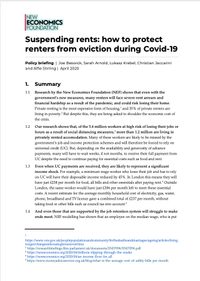Suspending rents
How to protect renters from eviction during Covid-19
04 May 2020
Research by the New Economics Foundation (NEF) shows that even with the government’s new measures, many renters will face severe rent arrears and financial hardship as a result of the pandemic, and could risk losing their home. Private renting is the most expensive form of housing, and 35% of private renters are living in poverty. But despite this, they are being asked to shoulder the economic cost of the crisis.
Our research shows that, of the 5.6 million workers at high risk of losing their jobs or hours as a result of social distancing measures, more than 1.2 million are living in privately rented accommodation. Many of these workers are likely to be missed by the government’s job and income protection schemes and will therefore be forced to rely on universal credit (UC). But, depending on the availability and generosity of advance payments, many will have to wait weeks, if not months, to receive their full payment from UC despite the need to continue paying for essential costs such as food and rent.
Even when UC payments are received, they are likely to represent a significant income shock. For example, a minimum wage worker who loses their job and has to rely on UC will have their disposable income reduced by 45%. In London this means they will have just £238 per month for food, all bills and other essentials after paying rent. Outside London, the same worker would have just £386 per month left to meet these essential costs. A recent estimate for the average monthly household cost of electricity, gas, water, phone, broadband and TV licence gave a combined total of £237 per month, without taking food or other bills such as council tax into account.
And even those that are supported by the job retention system will struggle to make ends meet. NEF modelling has shown that an employee on the median wage, who is put onto the job retention scheme, can expect to have their income after tax reduced by 16%. Renters spend on average a third of income on rent, so a reduction in income by almost a fifth could rapidly make housing costs unaffordable.
In order to avoid plunging renters into financial hardship, and potentially triggering an eviction crisis following the pandemic, we are proposing a UK-wide suspension of rents and mortgage freeze. These measures would have no significant additional cost to the government, although Bank of England loans would need to be made available for banks to cover lost liquidity from mortgage payments, and some landlords may need to rely on the job retention schemes.
Campaigns Coronavirus response
Topics Housing & land







